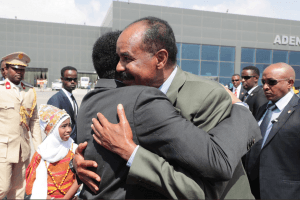Eritrean President Afwerki visits Somalia that is mired in political turmoil
“Today marks a new era for our two nations’ bilateral relations,” tweeted the office of President Farmajo.
By The Star Staff Writer
MOGADISHU – Eritrean President Isaias Afwerki paid his first visit to the Somali capital on Thursday to bolster his country’s historical ties with the Horn of Africa nation that supported his people’ struggle for independence from Ethiopia.
“It is a great honour to welcome President Isaias Afwerki to #Mogadishu today on this historic visit. #Somalia and #Eritrea have a historic bond of friendship which we will transform into modern opportunities for our two brotherly peoples. Soo Dhawoow Mudane Madaxweyne!,” said President Mohamed Abduulahi Mohamed “Farmajo in a Twitter message after receiving the Eritrean leader.
Afwerki’s visit is “part and parcel of the consultative Tripartite Summits of the Heads of State and Government of Eritrea, Ethiopia and Somalia,” tweeted Yemane G. Meskel, Eritrea’s Information Minister.
On Sept. 5, 2018, the leaders of Somalia, Eritrea and Ethiopia agreed to “foster comprehensive cooperation,” promote “regional peace and security” and “build close political, economic, social, cultural and security ties.”
Many Somalis have raised concerns over that agreement, saying President Farmajo’s aim of forging closer ties with Asmara and Addis Ababa is to bring in Ethiopian and Eritrean troops to the country to consolidate his power, especially at at time when his once skyrocketing popularity took a battering in recent months due to his administration’s political blunders.
Somali lawmakers have on Sunday submitted an impeachment motion against President Farmajo, accusing him of entering into “secret” agreements with Eritrean and Ethiopian governments, among other issues.
Parliamentary Speaker Mohamed Mursal Sheikh Abdirahman on Wednesday said that the motion — which he signed — would be handled according to the constitution and parliament’s Standing Orders.
The relationship between President Farmajo and Abdirahman has since nosedived, with the latter moving out of his official office-cum-residence and putting up at a hotel in the capital after government security agents barred lawmakers from visiting him.
At Mogadishu’s Aden Abdulle International Airport, however, President Farmajo showed little signs of that political turmoil threatening his future, welcoming his Eritrean counterpart with hugs and smiles.
“I had very productive discussions with H. E President Isaias Afwerki. Strengthening our two countries’ bilateral relations is important, it’s necessary for the bright future we want to build together. We are jointly embarking on a new era of regional cooperation on many fronts,” said President Farmajo.

Somalia, which is recovering from decades of civil war and lawlessness, was once the scene of a regional proxy war between Ethiopia and Eritrea, with the UN saying at one time that about 6000 to 8000 Ethiopians and 2000 fully equipped Eritrean troops were in the country to support opposing sides in Somalia’s conflict.
In 2006, Ethiopia invaded Somalia under the pretext of propping up a weak, internationally-backed Somali government that was being threatened by the forces of united Islamic courts that seized power in June 2006.
The Islamists, who were later ousted from power by US-backed Ethiopian forces, restored peace to Mogadishu for the first time in a decade and a half after routing predatory, US-financed warlords who divided the country into fiefdoms following the collapse of the nation’s central government in 1991.
Eritrea was the only country that openly supported Somalis’ struggle against the Ethiopian forces that occupied Somalia between 2007 and 2009. To protest Ethiopia’s invasion of the Horn of Africa nation, Asmara suspended its membership of the Intergovernmental Agency for Development, a regional bloc also known as IGAD that was largely under Addis Ababa’s influence.
Asmara’s bold decision to support Somalis’s push to remove Ethiopia from their country has angered many countries, including the United States, which provided Ethiopian forces in Somalia with military and intelligence support.
Although Asmara’s policy appeared to have largely been dictated by its desire to get back at the Ethiopian regime led by late dictator Meles Zenawi, yet Eritrea’s financial and military support for anti-Ethiopian Somali groups were an attempt to return the favor to Somalis who stood shoulder to shoulder with Eritreans during their guerrilla warfare to split off from Ethiopia, of which they were part before their independence in 1993.
The ties between Somalia and Eritrea, which soured in the early 2000s after Somali leaders became putty in late Meles Zenawi’s hands, was only officially restored on July 30th this year.
“Today marks a new era for our two nations’ bilateral relations,” tweeted the office of President Farmajo.
The Eritrean leader will travel to Nairobi from Mogadishu to meet with President Uhuru Kenyatta, said Meskel, the Eritrea’s Information Minister, in a Twitter message on Thursday.

